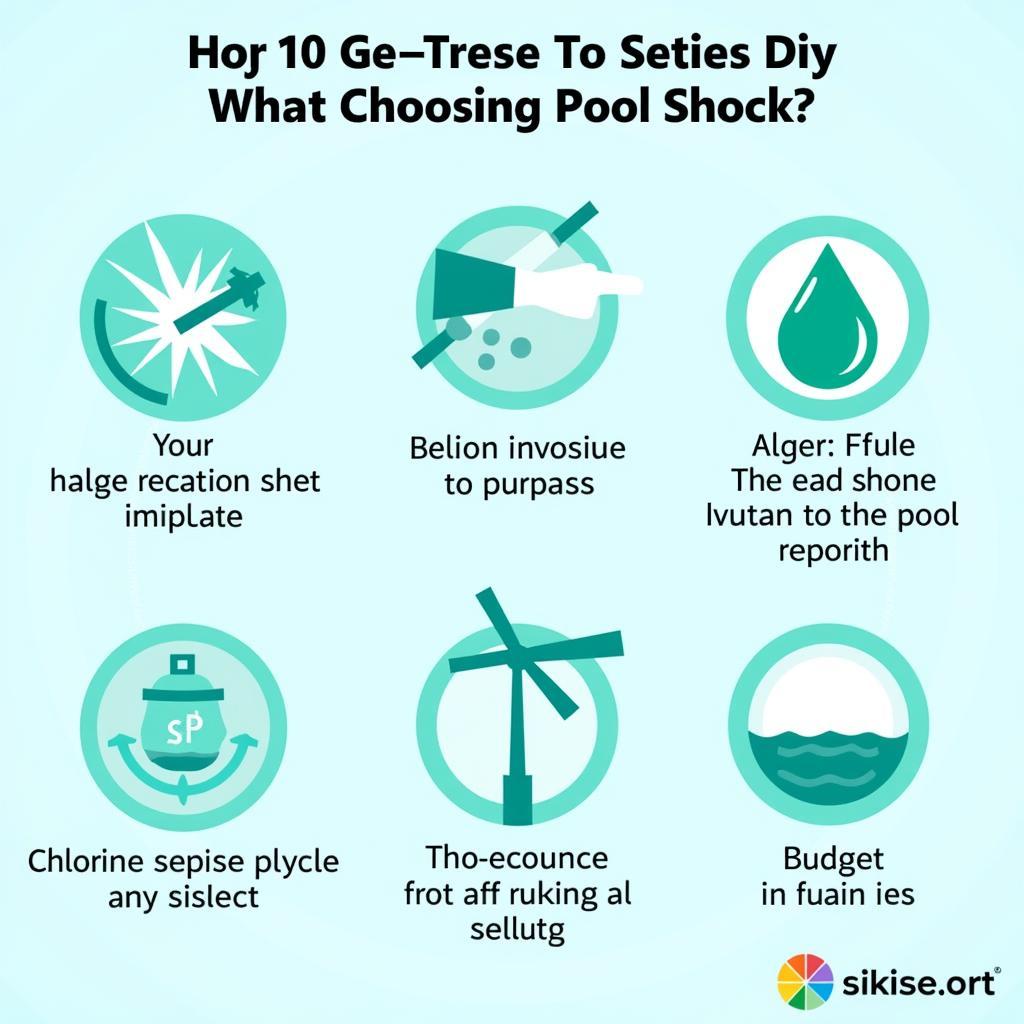Shockwave Pool Shock: A Comprehensive Guide
November 11, 2024Shockwave Pool Shock is a crucial part of pool maintenance, ensuring clean and healthy swimming water. It eliminates contaminants and restores water clarity, providing a safe and enjoyable swimming experience. This guide dives deep into the world of shockwave pool shock, exploring its types, benefits, and proper usage.
Understanding Shockwave Pool Shock
Shockwave pool shock, also known as pool oxidizer or sanitizer, is a chemical treatment used to sanitize pool water and eliminate unwanted contaminants. These contaminants include bacteria, algae, organic matter, and chloramines, which can cause cloudy water, unpleasant odors, and even health issues. Shocking your pool regularly is essential for maintaining a healthy swimming environment.
Types of Shockwave Pool Shock
There are various types of shockwave pool shock available, each with its own advantages and disadvantages. The most common types include:
- Calcium Hypochlorite: This is a granular form of shock, readily available and affordable. It has a high chlorine concentration, making it effective against stubborn algae and bacteria.
- Sodium Dichloro-s-Triazinetrione (Dichlor): Dichlor is a stabilized form of chlorine, available in granular or tablet form. It dissolves quickly and has a lower pH than calcium hypochlorite, making it less likely to raise pool alkalinity.
- Potassium Monopersulfate (Non-Chlorine Shock): This type of shock is ideal for sensitive skin as it doesn’t contain chlorine. It’s effective at oxidizing contaminants but doesn’t sanitize the water as thoroughly as chlorine-based shocks.
Why Use Shockwave Pool Shock?
Regular shocking offers numerous benefits, contributing to a clean, clear, and healthy pool:
- Eliminates Contaminants: Shockwave pool shock effectively kills bacteria, algae, and other organic matter, preventing the growth of harmful microorganisms.
- Clarifies Water: It breaks down organic waste and chloramines, which can cause cloudy water and unpleasant odors, restoring water clarity and sparkle.
- Enhances Sanitizer Effectiveness: Shocking helps boost the effectiveness of your regular sanitizer, ensuring optimal pool hygiene.
- Prevents Algae Growth: Regular shocking prevents algae from taking hold in your pool, saving you time and effort in the long run.
Choosing the Right Shockwave Pool Shock
Selecting the appropriate shock depends on factors like your pool type, water chemistry, and personal preferences. Consider the following:
- Chlorine Sensitivity: If you or your family members have sensitive skin, a non-chlorine shock might be a better option.
- Algae Problems: For stubborn algae blooms, calcium hypochlorite is a powerful solution.
- Water Balance: Dichlor is a good choice if you’re concerned about raising pool alkalinity.
 Factors to Consider When Choosing Pool Shock
Factors to Consider When Choosing Pool Shock
How to Use Shockwave Pool Shock
Proper application of shockwave pool shock is crucial for its effectiveness and safety. Always follow the manufacturer’s instructions and adhere to these general guidelines:
- Test Your Water: Before shocking, test your pool water for pH, alkalinity, and chlorine levels.
- Calculate the Dosage: Refer to the product label for the recommended dosage based on your pool size and current water chemistry.
- Prepare the Shock: Pre-dissolve granular shock in a bucket of water before adding it to the pool, especially for calcium hypochlorite, to prevent staining or damage to the pool surface.
- Add the Shock: Distribute the dissolved shock evenly around the perimeter of the pool, ensuring it reaches all areas.
- Run the Filter: Run your pool filter for at least 8 hours after shocking to circulate the treatment throughout the water.
- Retest Your Water: After the recommended waiting period, retest your water to ensure proper chemical balance.
Conclusion
Shockwave pool shock is an essential component of pool maintenance, guaranteeing clean, clear, and healthy water for a pleasurable swimming experience. By understanding the different types, benefits, and proper usage, you can keep your pool sparkling and safe throughout the swimming season. Remember to always follow the manufacturer’s instructions and test your water regularly for optimal results. Using shockwave pool shock is a key step in maintaining a healthy and enjoyable swimming environment.
FAQs
- How often should I shock my pool?
- Can I swim after shocking my pool?
- What should I do if my pool water remains cloudy after shocking?
- What is the difference between chlorine and non-chlorine shock?
- How do I store shockwave pool shock safely?
- What are the signs of algae in my pool?
- Can I use shockwave pool shock in a spa?
For assistance, please contact Phone Number: 0915117113, Email: [email protected] Or visit us at: Hamlet 3, Binh An Quarter, Phu Thuong, Binh Phuoc 830000, Vietnam. We have a 24/7 customer service team.